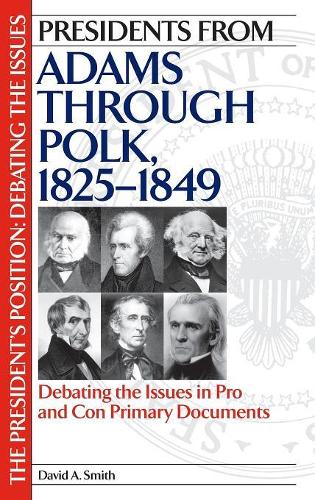
Presidents from Adams through Polk, 1825-1849: Debating the Issues in Pro and Con Primary Documents
(Hardback)
Publishing Details
Presidents from Adams through Polk, 1825-1849: Debating the Issues in Pro and Con Primary Documents
By (Author) David A. Smith
Bloomsbury Publishing PLC
Greenwood Press
30th June 2005
United States
Classifications
General
Non Fiction
973.5
Physical Properties
Hardback
160
Description
It was the Era of Good Feelings, but all was not well with the young Republic. From 1825 to 1849, presidents John Quincy Adams, Andrew Jackson, Martin Van Buren, William Henry Harrison, John Tyler, and James K. Polk grappled with the legacy of the Monroe Doctrine, Indian removal, territorial expansion, the National Bank, tariffs, economic depressions, War with Mexico, near war with Great Britain, and the place of slavery in the growing nation. As one would expect from confident citizens of the burgeoning young country, conflicting arguments swirled around the hot-button issues of the day. This rich resource of primary documents enables students to read these arguments first hand, and feel the passions and study the logic driving their often forceful positions. All of the primary documents are annotated and placed into historical context. A thorough index concludes the work.
Reviews
They were substantial and deliberative men, and they believed strongly in the promise of the new republic. They led the country as it faced the issues of Indian removal, repercussions of the Monroe Doctrine, rebirth of political parties, questions about the national banking system, abuses inherent in the selection of non-elected office holders, an economic panic, annexation woes, delicate dealings with foreign states, and, of course, the obscenity of slavery. Smith provides a series of primary documents arranged to help students develop their own conclusions about what Adams, Jackson, Van Buren, Harrison, Tyler, and Polk did and did not do about the challenges facing the nation. * Reference & Research Book News *
Author Bio
David A. Smith is Lecturer, Department of History, Baylor University, Waco, TX. He is the author of George S. Patton: A Biography (Greenwood, 2003).
